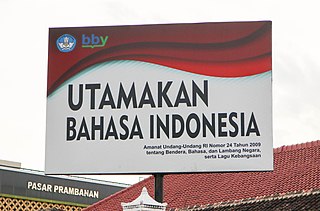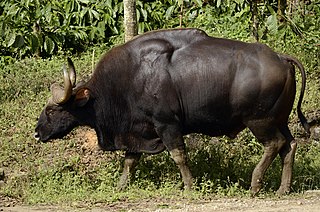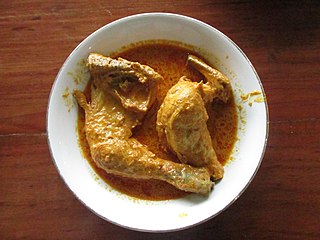Selembu is a dual purpose dairy and beef breed of cattle. It is the result of gaur/zebu hybridisation. The name is a hybrid from Malay name of Seladang (gaur) and Lembu (Cow).

Selembu is a dual purpose dairy and beef breed of cattle. It is the result of gaur/zebu hybridisation. The name is a hybrid from Malay name of Seladang (gaur) and Lembu (Cow).


The Malay Peninsula is located in Mainland Southeast Asia. The landmass runs approximately north–south, and at its terminus, it is the southernmost point of the Asian continental mainland. The area contains Peninsular Malaysia, Southern Thailand, and the southernmost tip of Myanmar (Kawthaung). The island country of Singapore also has historical and cultural ties with the region.

Indonesian is the official and national language of Indonesia. It is a standardized variety of Malay, an Austronesian language that has been used as a lingua franca in the multilingual Indonesian archipelago for centuries. With over 280 million inhabitants, Indonesia ranks as the fourth most populous nation globally. According to the 2020 census, over 97% of Indonesians are fluent in Indonesian, making it the largest language by number of speakers in Southeast Asia and one of the most widely spoken languages in the world. Indonesian vocabulary has been influenced by various native regional languages such as Javanese, Sundanese, Minangkabau, Balinese, Banjarese, and Buginese, as well as by foreign languages such as Arabic, Dutch, Portuguese, and English. Many borrowed words have been adapted to fit the phonetic and grammatical rules of Indonesian, enriching the language and reflecting Indonesia's diverse linguistic heritage.

Bovines comprise a diverse group of 10 genera of medium to large-sized ungulates, including cattle, bison, African buffalo, water buffalos, and the four-horned and spiral-horned antelopes. The members of this group are classified into loose tribes rather than formal subgroups, as the evolutionary relationships within the groups are still uncertain. General characteristics include cloven hooves and usually at least one of the sexes of a species having true horns. The largest extant bovine is the gaur.

The gaur is a large bovine native to the Indian Subcontinent and Southeast Asia, and has been listed as Vulnerable on the IUCN Red List since 1986. The global population was estimated at a maximum of 21,000 mature individuals in 2016, with the majority of those existing in India. It is the largest species among the wild cattle and the Bovidae.

Malay is an Austronesian language that is an official language of Brunei, Indonesia, Malaysia, and Singapore. It is also spoken in East Timor and southern part of Thailand. Altogether, it is spoken by 290 million people across Maritime Southeast Asia.
This article outlines the differences between Malaysian English, Malaysian Colloquial English (Manglish) and British English, which for the purposes of this article is assumed to be the form of English spoken in south east England, used by the British Government, the BBC and widely understood in other parts of the United Kingdom.

The gayal, also known as the Drung ox or mithun, is a large domestic cattle distributed in Northeast India, Bangladesh, Myanmar and in Yunnan, China.

The Malay Mail is an online news portal in Kuala Lumpur, Malaysia. It is the continuation of a print paper which was first published on 1 December 1896 when Kuala Lumpur was the capital of the then new Federated Malay States, making it the first daily newspaper to appear in the FMS. In December 2018, it ceased printing after 122 years but has continued as a news portal.

Bandhavgarh National Park is a national park of India, located in the Umaria district of Madhya Pradesh. Bandhavgarh, with an area of 105 square kilometres (41 sq mi), was declared a national park in 1968 and then became Tiger Reserve in 1993. The current core area is spread over 716 square kilometres (276 sq mi).

Babulal Gaur was an Indian politician from Bharatiya Janata Party (BJP) who served as the 16th Chief Minister of Madhya Pradesh. He was elected ten times to the Madhya Pradesh Legislative Assembly, twice from Bhopal South and eight times from Govindpura. He retired from electoral politics in 2018 due to old age.
Personal names in Malaysia vary greatly according to ethno-cultural group. Personal names are, to a certain degree, regulated by the national registration department, especially since the introduction of the National Registration Identity Card (NRIC).

Senegalia catechu, previously known as Acacia catechu, is a deciduous, thorny tree which grows up to 15 m (50 ft) in height. The plant is called kachu in Malay; the Malay name was Latinized to "catechu" in Linnaean taxonomy, as the species from which the extracts cutch and catechu are derived. Other common names for it include kher, catechu, cachou, cutchtree, black cutch, and black catechu.

The Sultanate of Sambas was a traditional Malay state on the Western coast of the island of Borneo, in modern-day Indonesia.

Ketapang, or Tau-pang in Teochew, is the administrative capital of Ketapang Regency, one of the regencies of West Kalimantan province on the island of Borneo in Indonesia. Ketapang town is located at 1°51′S109°59′E and is a town on the delta of the Pawan River. Ketapang is served by the Rahadi Oesman Airport.

The National Zoological Park is a 176-acre (71 ha) zoo in New Delhi, India.

Sri Lankan Malays, historically known as Ceylon Malays, are Sri Lankan citizens with full or partial ancestry from the Indonesian Archipelago, Malaysia, or Singapore. In addition, people from Brunei and the Philippines also consider themselves Malays.

Gomostapur or Gomastapur is a village in Bangladesh located in Gomostapur Upazila in the northwestern district of Chapai Nawabganj.

Gulai is a Minangkabau class of spicy and rich stew commonly found in Indonesia, Malaysia and Singapore. The main ingredients of this dish are usually poultry, goat meat, beef, mutton, various kinds of offal, fish and seafood, as well as vegetables such as cassava leaves, unripe jackfruit and banana stem.

Govindpura Assembly constituency is one of the 230 assembly constituencies of Madhya Pradesh. It comes under Bhopal district.

Perak Football Club or KBS Perak is a professional football club based in Ipoh. Founded in 1921, the club's home ground since then has been Perak Stadium in Ipoh, Perak. The club represents the state of Perak in Malaysian football competitions. The team is currently playing in the first-tier of Malaysian football, the Malaysia Super League, having been promoted from the Malaysia Premier League after the M-League had been revamped.